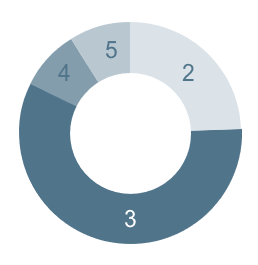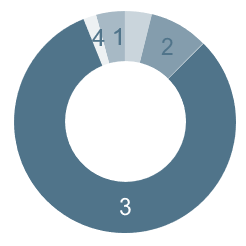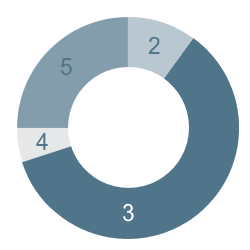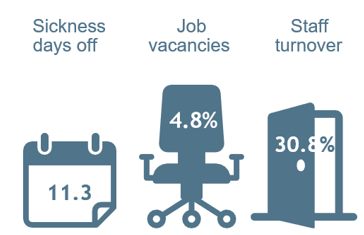Quality
CQC Regulated Services
The majority of commissioned adult care services including public health services are subjected to CQC ratings and inspections.
As a Council, we strive towards all providers being rated by CQC as excellent or good. The Council will continue to work with providers to collaborate to improve services.

Nursing Homes (all age groups)
- Inadequate (none)
- Requires Improvement (6) 25%
- Good (14) 58.33%
- Outstanding (2) 8.33%
- Unrated (2) 8.33%

Residential Care (all age groups)
- Inadequate (2) 3.39%
- Requires Improvement (5) 8.47%
- Good (49) 83.05%
- Outstanding (1) 1.69%
- Unrated (2) 3.39%

Community Based Care: All Cohorts
(commissioned and non-commissioned)
This includes home care and support services and supported living.
- Inadequate (none)
- Requires Improvement (4) 10%
- Good (24) 60%
- Outstanding (2) 5%
- Unrated (10) 25%
Public Health CQC Regulated Services
The Council commissions a range of Public Health services that are subject to regulation, but these sometimes are provided as part of a bigger NHS Trust. As such the specific services may not have a separate report or rating.
Quality Assurance
Quality standards will be clearly defined in service specifications and all of our contracted providers will be subject to an annual audit against contract compliance.
Through our established partnerships the Council will work alongside providers to address quality issues offering support, advice, guidance and training.
The Council has recently entered into a three year contract with Access Group to implement a Provider Assessment and Market Management Solution (PAMMS). The implementation stage is due to be completed by March 2023.
PAMMS will be used by Commissioners and Contract Managers to collate data and intelligence on both regulated and non-regulated services across the Borough and will be used to support our market shaping duties. This is being currently rolled out within Adult Care Commissioning with the potential for future expansion across Public Health commissioned services.
Adult Social Care Early Warning Systems
A number of early warning systems are in place to inform the view of quality, performance and risk and assist in planning any interventions to be undertaken with services commissioned by Adult Social Care. These include:
- Focussed Inspection Visits
- Provider Quality Assurance Self-Assessment
- Contract Concerns Database
- Professional Questionnaire
- Intelligence from safeguarding alerts and investigations
- Risk Dashboard
Focussed Inspection Visits
Service provider visits (announced or unannounced) are undertaken by Contract Compliance Officers to focus on service issues or validate self-assessments.
Provider Quality Assurance Self-Assessment
A self-assessment is completed by service providers to record evidence of compliance against specified service standards. Evidence is recorded by the provider on the Provider Assessment Market Management Solution (PAMMS). Each submission is reviewed, validated and scored to give an overall rating of the service.
Contract Concerns Database
The contract concerns electronic database is a real time monitoring system of market intelligence. The system facilitates a method for people accessing services, their families and professionals to report concerns to the Council about their experience of a service.
The contract concerns database allows for the recording of the progression and outcome of the investigation of the concern including the provider's response. It also records the theme and outcome e.g. whether the concern was substantiated or not.
Professional Questionnaire
Professional Questionnaires are completed by professionals visiting contracted services or people receiving service at home, to provide feedback on their experience which contribute to the overall view of the quality of the care provided.
Risk Dashboard
Data included in the assessment of services is extracted from a number of internal and external systems i.e., Safeguarding Team, CQC data set, NHS Capacity Tracker, and other generated reports to inform the levels of quality and compliance in a service. The Risk Matrix is an intuitive conduit for data/intelligence which calculated the level of risk rating the service Red, Amber, Green (RAG) and is used to prioritise the Contract Compliance Officers' resources.
Adult Social Care Workforce
As of October 2021, Rotherham had an estimated 7,200 jobs in the care sector, with the following care sector split:
- 84.7% are in the independent sector
- 9.7% are employed by the local authority
- 7.4% of jobs are working for direct payment recipients
Adult Social Care Skills, Recruitment and Retention
Skills for Care presented the following figures from 2020/21
- on average 11.3 days off sickness was taken
- the average job vacancy rate was 4.8%
- the average job staff turnover rate was 30.8%
All rates are consistent with local and national pictures.
Vacancy, turnover and sickness day trends have increased at both a national, regional and local level since March 2021 due to the COVID-19 pandemic.
Independent sector workforce recruitment and retention has faced difficulties prior to the pandemic due to financial constraints, Britain exiting the EU, increased complexity of care, the increase in demand for carers assessment and community assets which has been further exacerbated by Covid-19.
The Council aims to make care and support a more attractive career option by improving conditions and career pathways and encourage providers new and existing to demonstrate effective approaches to value based recruitment and retention.

